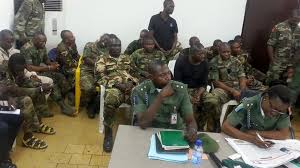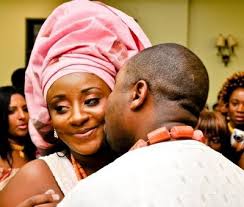TIn an apparent move to stem the tide of of mutiny and other offences, the Nigerian army is putting another batch of its officers and men on trial.
The army on Thursday inaugurated a general court-martial to hear charges against 97 soldiers, including 16 officers accused of mutiny, assault, cowardice and refusing to fight members of Boko Haram in the north eastern part of the country.
After the President of the general court martial and other members of the panel took their oath of office, signalling the commencement of the trial, there was an argument between the defence lawyers and the Judge-Advocate of the court martial, Lieutenant-Colonel Ukpe Ukpe.
Counsels to the accused persons, Femi Falana and Godwin Anyamelechi, argued that having been listed as the Assistant Director of Legal Services to the Nigeria Army, Lieutenant-Colonel Ukpe cannot play the role of the Judge-Advocate since he may have given judicial advice in the case.
This position was opposed by the prosecuting counsel, Captain Ruth Agwai with Lt Colonel Ukpe also defending his position as the Judge Advocate. According to him, the law has stipulated the condition and criteria of a Judge Advocate.
Nevertheless, Lt Colonel Ukpe eventually took his oath after the arguments, when no further objection was raised to his position as Judge Advocate.
To kick-start the trial, the President of the Court Martial, Brigadier-General Musa Yusuf, listed the charges against the accused persons and gave the assurance that the trial would not only be accelerated but that he would ensure fair-hearing to all the accused soldiers and justice would be done at the end.
Trial of the accused persons has been fixed for October 15, 2014.
The president of the first general court-martial, Brig-Gen. Chukwuemeka Okonkwo, had on September 15, 2014, sentenced 12 of the 18 soldiers charged with mutiny to death by firing squad, while one was sentenced to 28 days imprisonment with hard labour. Five others were set free.
After the ruling, Okonkwo said that “these sentences are subject to confirmation”, meaning that they can be appealed at the Court of Appeal.
But unlike the first trial which was not open to the media until the day of judgement, this one was publicized from the beginning, starting with from the inauguration of the trial team.
That accounts for why the likes of human rights lawyer Femi Falana, SAN, has led other attorneys to defend some of the accused and insisted on the right of every suspect to be considered innocent until proved otherwise in line with the provisions of Section 35 (5) of the 1999 Constitution, a demand the court-martial president, Brig-Gen. Musa Sani Yusuf, acceded to.
In his inaugural address, he said, “From the record made available by the prosecution, a total of 97 accused persons are listed for trial by this general court-martial (GCM) for various offences. The offences for the purpose of this trial could be conveniently categorised into mutiny, assault, absence without leave (AWOL), house breaking, conduct prejudicial to good orders and service discipline, offences relating to service property among others with a total of 97 accused persons involved.”
“Let me assure you that the GCM will base its decisions and findings only on the facts presented before it. In other words, this court will not give room for, or be influenced by, any extraneous matter which is not presented before this court.
“In consonance with the desire of this GSM to do justice in this case, we shall take cognizance of the postulation of Justice Oputa of the Supreme Court (JSC) – that justice is a three- way traffic; that is, ‘justice for the accused persons, justice for the victim and justice for the state’. We intend to painstakingly listen to all evidence that will be brought before this court to ensure that no innocent person is convicted, as it is better for nine persons to go free than for one innocent person to suffer.”
He urged the defence lawyers to assist the tribunal in its intention “to conduct and conclude this case without undue or unnecessary delay.”














